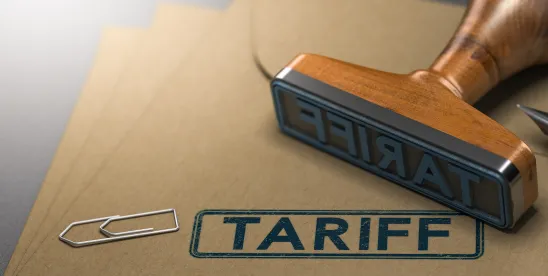Key Takeaways:
- The U.S. Court of Appeals for the Federal Circuit (CAFC) affirmed the U.S. Court of International Trade’s decision to strike down the reciprocal and fentanyl tariffs imposed under IEEPA.
- However, the reciprocal and fentanyl tariffs remain in place pending the U.S. Supreme Court’s review of the CAFC’s decision.
- The Supreme Court’s decision will not affect the tariffs imposed or to be imposed under other legal authority such as Sections 232 and 301.
On Sept. 9, 2025, the U.S. Supreme Court issued an order granting the government’s petition for a writ of certiorari to hear, on a consolidated basis, two cases concerning the legality of certain tariffs imposed this year by President Trump. As requested by the government, the Supreme Court set a fast-track schedule with opening briefs due Sept. 19 and oral argument scheduled for the first week of November. Pending the Supreme Court’s review, the reciprocal and fentanyl tariffs remain in place.
What follows is a summary of how the cases reached the Supreme Court, how the U.S. Court of Appeals for the Federal Circuit (CAFC) ruled and what comes next in this closely watched dispute.
Procedural Background: CAFC Affirmed the CIT’s Decision Invalidating Tariffs, Remanded the Injunction
On Aug. 29, 2025, the CAFC affirmed — in a 7-4 split decision — the U.S. Court of International Trade’s (CIT) decision in V.O.S. Selections, Inc. v. Trump invalidating President Trump’s sweeping reciprocal and fentanyl tariffs on the grounds that they exceeded the presidential power granted by the International Emergency Economic Powers Act (IEEPA), 50 U.S.C. § 1701 et seq.
Despite affirming CIT’s decision on the merits, the CAFC vacated the lower court’s injunction and remanded for further consideration whether it complies with the standards recently outlined by the Supreme Court in Trump v. Casa. That step, however, must first await the Supreme Court’s review, which will also include a similar case that was pending before D.C. Circuit: Learning Resources, Inv. v. Trump.
Key Holdings from the CAFC
1. Tariff Authority Exceeds Statutory and Constitutional Limits
The CAFC first examined the statutory text, determining that although the statute “bestows significant authority on the President to undertake a number of actions in response to a declared national emergency,” that authority does not include the power to impose tariffs like the ones at issue. According to the CAFC, tariffs are a form of taxation — a power exclusively reserved for Congress under the Constitution. And, although the IEEPA permits the President to “regulate” foreign commerce during emergencies, the CAFC held that term does not encompass imposing tariffs. In so holding, the CAFC pointed to the statute’s absence of explicit language regarding duties, taxes or tariffs — noting that when Congress intended to delegate tariff authority to the President, it had done so explicitly.
2. The Major Questions Doctrine Bars Sweeping Tariff Powers
Next, the CAFC held that the government’s reading of the IEEPA — as providing the President power “to impose unlimited tariffs”— ran “afoul” of the major questions doctrine, holding that the statute lacked the “clear congressional authorization” required to impose tariffs of such “unheralded” and “transformative” magnitude.
3. Yoshida II Precedent Doesn’t Apply
The CAFC also distinguished Yoshida Int’l v. United States, 526 F.2d 560 (CCPA 1975) (Yoshida II), a case heavily cited during oral arguments in July. In Yoshida II, President Nixon’s tariffs under the Trading with the Enemy Act (the predecessor to the IEEPA) were a temporary measure of limited nature — in contrast to President Trump’s reciprocal and fentanyl tariffs that are “unbounded in scope, amount and duration.”
4. Dissent Finds Broader Emergency Powers
This decision was not unanimous, however. Four of the eleven judges concluded that the phrase “regulate importation” in the IEEPA should be interpreted expansively in the context of national emergencies. They drew parallels to Section 232 of the Trade Expansion Act of 1962, where Congress delegated authority to the President to “adjust imports”— suggesting that imposing tariffs is a traditional and appropriate tool for regulating imports.
Reciprocal and Fentanyl Tariffs Remain in Place, For Now
Pending the Supreme Court’s review of the CAFC’s decision, both reciprocal and fentanyl tariffs remain in place. If the Supreme Court affirms the CAFC’s holding, Secretary of the Treasury Scott Bessent has stated that the government will refund the previously collected reciprocal and fentanyl tariffs and stop collecting them. However, the Supreme Court’s decision will not affect the tariffs imposed under other legal authorities, such as Section 232 (e.g., steel, aluminum, autos, and copper) or Section 301 of the Trade Act of 1974 (imposed against certain imports from China).






 />i
/>i

